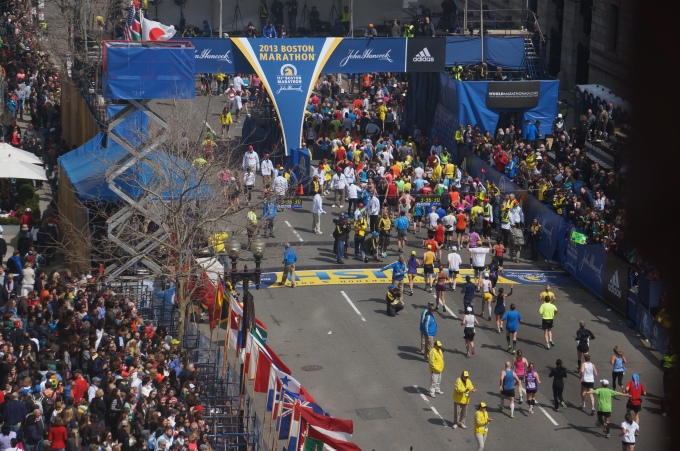 In the wake of the Boston Marathon bombings, the tragic event appears to be yet another reminder of the fragility of life and the senselessness of destruction.
In the wake of the Boston Marathon bombings, the tragic event appears to be yet another reminder of the fragility of life and the senselessness of destruction.
In the face of dangerous unknowns, anxiety, fear, and panic can understandably set in.
But, let’s not let it.
Terrorists seek to hurt, kill, maim, and disturb ordinary life; they wish to cause anxiety and panic. Terrorists want to sow fear.
How should we respond to tragedies?
And I’m not talking about an emergency plan or kit – like the Department of Homeland Security and FEMA suggest (in a very brief article, or message, rather)*.
I believe that our response to terrorist attacks should begin twofold – administering to the wounded and the loved ones of those killed and to find out if there are any additional threats.
David Rothkopf of CNN Opinion says that 9/11 taught us that we must care for ourselves in the pursuit of truth – “We must fight to retain our equilibrium and our cool.”
As much as we wish to take retaliatory action in the horrific moments after the attack, careful, reflective searching for the truth is far more important. Rothkopf states that reflexive actions only increase the panic and the costs of the terrorist attacks.
Economists (but just a few**) can and do assess public sentiment after an attack, an assessment that goes beyond sensationalist media and anecdotes***. Gary Becker of the University of Chicago and Yona Rubinstein of Tel Aviv University are two such economists.
According to these economists, it seems that people often respond to terrorist attacks much as they would to a rare but frightening disease.
After the devastatingly tragic 9/11 terrorist attacks, the number of flying miles on America’s airlines fell 32%. It has taken years for air travel to return to its pre-9/11 peak. But, the threat of being on a hijacked plane – particularly after the industry’s heightened security – is incredibly minute.
Ignorance of how tiny the risk is may be at work, but that perspective misunderstands the purpose of terrorism to spread fear. Some economists argue that people respond to fear and not risk. Terrorists create a fear of a violent death in daily activities such as taking the bus or being at work.
However, Becker and Rubinstein find that regular flyers or bus riders are not deterred by terrorist attacks, while casual flyers or riders are. Whether it is out of necessity or custom, these regular users should be an example to the rest of us.
We need to continue to go about our daily lives, and we need to not behave in an intimidated, defiant, or retaliatory manner. This is the best way to maintain order and minimize disruption of ordinary life.
It may be habitual bravery, but we all need to be inspired to rely more on our bravery, as well as our integrity.
*I do highly recommend having an emergency kit, or a ‘bug-out bag’ as my fiance calls them. Just a simple backpack with essentials and survival tools – easy to grab in an escape.
**Many economists avoid topics such as terrorism.
***Economists examine actions of individuals – what people do, not what they say.
Image is from Wikimedia Commons, Boston Marathon bombing, first bomb site 54 minutes before explosion by Aaron Tang
Sources:
“In the face of terror, keep calm” http://www.cnn.com/2013/04/15/opinion/rothkopf-boston-explosion/index.html?hpt=hp_t4
“Preparedness for and response to attacks and natural disasters” http://homeland.house.gov/issue/preparedness-and-response
“The rational response to terrorism” http://www.economist.com/node/4198336
“Fear and the response to terrorism: an economic analysis” http://www.ilr.cornell.edu/international/events/upload/BeckerrubinsteinPaper.pdf